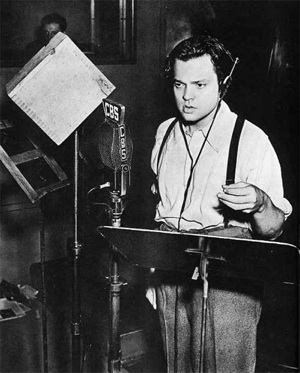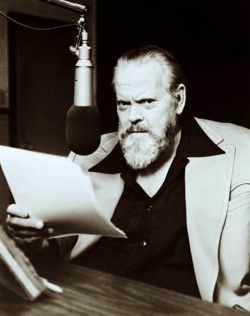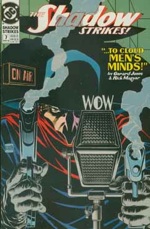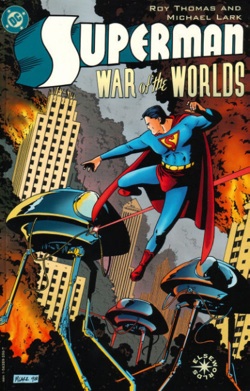Comics /
Cult Favorite
The Master's Voice
By Philip Schweier
October 28, 2008 - 18:01
A lot names may have become synonymous with Halloween. The Headless Horseman. the Great Pumpkin. Jack Skellington. For me personally, it's Orson Welles.
 |
| Young Orson Welles |
Welles was born in May 15, 1915, in Kenosha, Wisc. His father was an inventor, his mother a concert pianist. A gifted child, he inherited his parents’ intellect, with a talent for music and painting. Orphaned at the age of 15, he was under the guardianship of Dr. Maurice Bernstein, a name he later appropriated for his film,
Citizen Kane. His character, Charles Foster Kane, was entrusted as a young boy to a Mr. Bernstein, who oversaw the young Kane's vast fortune.
Finishing his education, Welles embarked on a sketching tour of Ireland. He tried unsuccessfully to break into acting on the London and Broadway stages, but with the help of Thornton Wilder and Alexander Woollcott, he joined Katherine Cornell's road company, making his New York debut in 1934. That same year he married his first wife, Virginia Nicholson. They divorced in 1940.
During the 1930s, while working at various radio stations in Manhattan, he found it challenging to be on time for his live shows due to New York City street traffic. Discovering that the law did not require one to be sick to hire an ambulance, he took advantage of this loophole, traveling from one station to the next by ambulance.
He co-founded the Mercury Company with John Houseman in 1937. Together, they staged productions in New York City, one of the most famous being William Shakespeare's
Julius Caesar in a contemporary setting of fascist Italy. Another production was the controversial
Voodoo Macbeth, which he directed for the WPA theatre project. Set in Haiti, the play used an all black cast.
On Sept. 26, 1937, at age 22, Welles assumed one his most famous roles, The Shadow. He starred in 26 episodes sponsored by Blue Coal, and recorded 15 more for Goodrich Safety Silvertown tires to be broadcast over the summer of 1938. Welles left to launch his "Mercury Theatre on the Air."
Beginning with an adaptation of
Dracula, Welles began a chaotic production schedule utilizing actors from his stage company. Last-minute re-writes and late-night rehearsals were standard practice, as the cast familiarized themselves with their roles right up to air time.
On Oct. 30, 1938, the Mercury company produced the famous
War of the Worlds broadcast, adapting the H.G. Wells science fiction tale. Presented in a news program format, writer Howard Koch initially struggled with the script, and Welles, involved in a stage production of
Danton's Death, had little time to offer any helpful input.
When Welles finally did see fit to put the final polish on the script, he added lengthier musical interludes and drawn-out speeches by "learned authorities" on the Martian invasion. These touches added a dimension of reality by avoiding the typical dramatic pacing for a radio program.
Also added were "eye witness" accounts. For inspiration, actor Frank Readick used recordings of Herbert Morrison's radio reports of the Hindenburg disaster from the year prior. This helped convey a sense of complete terror as the Martian emerged from its spacecraft, inspiring genuine fear among the more gullible audience members.
Perhaps one of the greatest contributing factors was Welles competition, ventriloquist Edgar Bergen and his dummy, Charlie McCarthy. As their program segued into a musical number at approximately 8:12, many listeners switched to other stations, and soon found the bogus news reports of the Martian landing in Grovers Mill, N.J., completely missing Welles' opening announcement.
Mistaking the dramatization for a bonafide invasion from outer space, rumor and confusion spread by word of mouth, adding to the atmosphere of anxiety. While some urban legends speak of panic in the streets, the truth is closer to an atmosphere of confusion and misunderstanding, though a number of crowds did gather at the alleged landing site.
It was almost 40 minutes into the program that a second announcement was made of the show being a dramatization. But by this time, many listeners had abandoned their homes in fear. Police stations and civil defense were besieged with phone calls. Streets were clogged as people sought to escape from what they were convinced was the end of the world.
As the truth came out, the confusion began to subside. Some parents began to listen to their sharp-eared youngsters that the noted authority from Princeton, Professor Richard Peirson, sounded a great deal like their radio hero, The Shadow.
In the days that followed, despite a public apology, lawsuits were filed against both Welles and CBS. Much of the blame was attributed to the relatively new medium of radio, and that Welles and his band of merry pranksters had no idea the effect their program would have on their audience. But it has always been suspected that Welles knew full well that some might take the broadcast seriously – though perhaps not on the scope that it did.
Nevertheless, the incident launched Welles to major fame. His weekly program became more popular than ever, and Hollywood was the next logical step for the young star. His first major film was
Citizen Kane (1941), which he wrote, directed and starred in. Though a commercial failure at the time, today it is regarded by many as one of the best films ever made.
In 1943, he re-married, this time to screen star Rita Hayworth. The marriage lasted five years. His third marriage in 1955 to Paoli Mori lasted until his death in 1985.
 |
| Orson Welles in his declining years |
Many of his subsequent films were commercial failures and he left for Europe in 1948. In 1956 he directed
Touch of Evil (1958); it failed in the U.S. but won a prize at the 1958 Brussels World's Fair. Many other films remained unfinished over the years.
In the 1970s, he was featured in a number of commercials for Paul Masson Wines, spouting the catch-phrase, "We will sell no wine before its time." He was also in contention for the role of Mr. Roarke on ABC's
Fantasy Island, and to provide the voice of Darth Vader in
Star Wars (1977).
In 1975, in spite of all his box-office failures, he received the American Film Institute's Lifetime Achievement Award, and in 1984 the Directors Guild of America awarded him its highest honor, the D.W. Griffith Award. His reputation as a film-maker has climbed steadily ever since.
Throughout much of his life, he became increasingly obese, weighing as much as 350 lbs. He died of a heart attack Oct. 10, 1985.
Welles has often been the subject of tribute in comics, largely due to his association with The Shadow. For DC Comics
The Shadow Annual #2 in 1988, Andrew Helfer penned "Agents," a tale reminiscent of
Citizen Kane. With The Shadow believed dead, a reporter interviews his agents in search of a clue as to his last word – "Lenore" – only for the answer to be revealed to the reader at the end.
When DC Comics re-launched the character in
The Shadow Strikes, issue #7 featured the story "To Cloud Men's Minds," in which New York actor/producer Grover Mills chooses The Master of Darkness as a stepping-stone for his own career by creating a radio program based on the exploits of The Shadow.
But perhaps Welles first comic book appearance was in "Black Magic on Mars," from
Superman #62. In the comedic tale, Welles is kidnapped by genuine Martians, led by the diminutive Martler. Broadcasting to Earth, Welles is naturally taken for "the little boy who cried wolf," until Superman investigates and together they foil the invasion.
In 1998, Superman once again fought off a Martian invasion, this time without Orson Wells. Roy Thomas blends H.G. Wells original story with the 1938 version of Superman's origin in an Elseworlds tale that is a delight to fans of both genres.
In 1974, the Atom starred as "The Little Man From Mars," in a tale by Martin Pasko and Mike Grell in
Action Comics #442. In the story, Ainsley Sheridan, who bears a strong resemblance to Charles Foster Kane, has bequeathed $1 million to Ivy University's scholarship fund on the condition that his personal papers be kept intact by the school. With a key page missing from one of his diaries, the Atom uses the time pool to journey back to Oct. 30, 1938, where the presence of a six-inch man only adds credence of the Martian "invasion."
Praise and adulation? Scorn and ridicule? Email me at philip@comicbookbin.com
Last Updated: March 3, 2025 - 20:40



